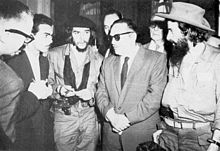Manuel Urrutia Lleó
Manuel Urrutia Lleó (Yaguajay, Sancti Spíritus, December 8, 1908-New York, July 5, 1981) was a Cuban politician, who was president of his country after the resignation of Fulgencio Cambric. He took office in January 1959, but due to differences with Fidel Castro, just seven and a half months later, he resigned and requested asylum in the Venezuelan embassy in Havana.
Biography
Role in the Cuban Revolution
Urrutia was born on December 8, 1908 in Yaguajay, province of Las Villas. He participated in the struggles against the dictatorships of Gerardo Machado and Fulgencio Batista. On March 14, 1957, in his capacity as judge of the then province of Oriente, he acted in the trial where one hundred and fifty individuals were accused of anti-government actions. Of the accused, twenty-two were captured when they were preparing to join the guerrilla after the Granma landing, among them Frank País). Urrutia ruled that:
...in view of the illegal usurpation and retention of power by Batista and his followers, the defenders acted according to their constitutional rights...
President of the Republic (1959)
Coming to power
After the triumph of the Cuban Revolution, the flight of Batista and the resignation of Anselmo Alliegro y Milá, on January 2, 1959, Urrutia was named provisional President of the Republic of Cuba and his government was recognized by the United States.. Through this move, Castro successfully sought to have the US government approve Urrutia for being considered a Christian, a moderate liberal, and for being an educated and charismatic person. At the time of the revolutionary victory, Urrutia was in exile in Venezuela, but returned on January 2 to take office. The new revolutionary government consisted largely of veteran and liberal Cuban politicians that included José Miró Cardona, who would be appointed Prime Minister of Cuba by Urrutia.
Differences with Fidel Castro

Once in power, Urrutia quickly began a program to close all brothels, casinos and lotteries, arguing that they had long been a corrupting influence on the Cuban state. However, this measure sparked protests from the employees of those businesses, so Castro convinced Urrutia to stop the execution of such a program until everyone had found alternative employment.
On February 16, after Miró's surprise resignation, Castro was named prime minister. This meant a progressive decrease in Urrutia's power while Castro's increased, with the president being reduced to a decorative figure as head of state. Various disputes arose between the president and the revolutionary leader, among which the reduction of the salary of Urrutia (which was the same amount that Fulgencio Batista received, 100,000 pesos a year) and the head of state's intentions to call elections again, to which Castro was categorically opposed, since the revolutionary leader considered that the return of the elections It would mean a return to the corrupt political parties and fraudulent voting that marked Batista's period.
Urrutia was accused by the newspaper Avance of having bought a luxury villa, which was interpreted as a sign of betrayal of the revolution. Urrutia denied the accusation and issued a court order against the newspaper for defamation. This story fueled tensions between the revolutionary government and the president, who also publicly refused to have disagreements with Fidel Castro. However, the truth is that by the middle of the year the President's power was only nominal, and Urrutia had completely distanced himself from the legislative government, including Castro, due to the growing communist influence in the state, against which he carried out a series of actions. critical comments. During the period in which Castro declared no affiliation with the Cuban communists, Urrutia was an avowed anti-communist because they had refused to support the insurrection against Batista.
Resignation
On July 17, 1959, just seven and a half months after taking office, Urrutia was forced to resign by Conrado Bécquer, leader of the sugar workers. Although Fidel Castro briefly resigned as prime minister in protest, that same day he also denounced the Urrutia government, considering that his & # 34; feverish anti-communism & # 34; was having a detrimental effect on the Cuban government. The sentiment of support for Castro sparked a popular demonstration against the head of state in front of the presidential palace, demanding Urrutia's immediate resignation and Castro's reinstatement as prime minister. Just one day later, finding himself without support, Urrutia agreed to resign. On July 23, Castro returned to the position of prime minister and named Osvaldo Dorticós Torrado, who was more loyal to the socialist reforms undertaken by the Revolution, president.
Later life
Once out of the government, Urrutia had to seek asylum in the Venezuelan embassy, who was received by the Mission staff in the middle of a shootout (wife and children included), when the Embassy was surrounded by the revolutionaries who were persecuting to other Cuban refugees without respecting the diplomatic rank of the facility. and later went into exile in the United States, where he was a Spanish teacher in the New York neighborhood of Queens. He died in New York on July 5, 1981.
| Predecessor: Anselmo Alliegro and Milá | President of the Republic of Cuba 1959 | Successor: Osvaldo Dorticós Torrado |
Sources
- [1]
- Inside the cuban revolution. Julia E. Sweig
Contenido relacionado
Policy
Angel Crespo
Jacques Chirac